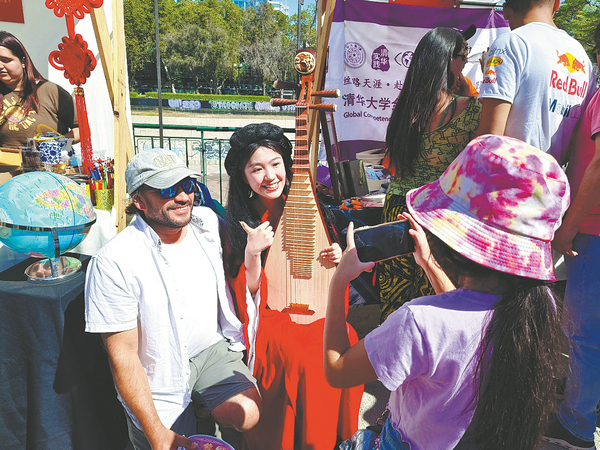

When Wang Yijun started to learn to play the pipa (a four-stringed Chinese lute) when she was 6, she probably could not have imagined that one day she would be performing at the Santiago Sculpture Park in Chile.
The performance by the third-year undergraduate student at Tsinghua University majoring in history took place on a sultry day in January during her winter vacation.
She was wearing a beautiful traditional hanfu style scarlet gown, holding a pear-shaped pipa with a huge smile on her face. Groups of people waited in line to take pictures with her and asked her to play something as she sat in front of the Tsinghua University booth at the Joyful Spring Festival celebration in Santiago. The event was co-hosted by the Chinese Embassy in Chile, the Municipal Government of Providencia in the east of the capital, the Confucius Institute at the Pontifical Catholic University of Chile, and the Chilean Dragon and Lion Dance Association.
The booth was designed by students from the Global Competence Overseas Practice Course and was divided into three categories, which included cultural products from Tsinghua, ethnic and intangible cultural heritage handicrafts and a photography exhibition of the Chinese countryside by Tsinghua students.
From Jan 11 to 25, a group of 11 students and two professors from Tsinghua University went to Chile and Argentina as part of a public interaction team to improve international competence and cultivate intercultural exchange among young people.
Alongside the cultural products on display, a student from Argentina, Jennifer Wei, became a temporary recruit specialist at the booth, and introduced Tsinghua University's international programs. She drew on her personal experience to depict its vibrant overseas study experience and set up a Q&A session for anyone who wanted to continue their education in China.
After hearing the introduction to Tsinghua, residents wrote their impressions of China on a poster. Some of them knew a bit of Chinese, scribbling the characters for "I love China" or "Happy Year of the Dragon". Some of them wrote, "thank you for coming and hope to see you very soon". A colorful and meaningful drawing completed by people from Chile displayed their captivation with China's seemingly exotic culture.
More than 10,000 people passed by the booth. Niu Qingbao, Chinese ambassador to Chile, and Ignacio Sanchez, the president of Pontifical Catholic University of Chile, also visited the booth. They recognized the effort of the Tsinghua teams and expressed their appreciation.
During the trip, Wang also played at a cultural exchange activity at the Argentina Citizens Martial Arts Club. The students from Tsinghua performed after a showcase of kung fu skills by members of the club. Wang played Li Huanzhi's Spring Festival Suite and Luis Fonsi's Despacito on her pipa, presenting cultural fusion, as well accompanying singing performances by other students. All the students and club members sang the 2008 Olympics theme song Beijing Welcomes You together, and danced through to the end of the event.
There are more than 300 members of the Argentina Citizens Martial Arts Club, only three of whom are Chinese. It promotes kung fu to Argentines. Chen Min, the founder of the club, says, "I thought about going back home, but the cultural exchange here is more important. Look at the students! They really enjoy Chinese martial arts."
The Spring Festival celebrations continued in Buenos Aires, especially in its Chinatown district. Visitors from all over the country gathered to see the dragon and lion dances, traditional musical performances and creative activities.
Chinese Argentine Carlos Lin was an unusually busy master of ceremonies, running around Chinatown and delivering live narration in both Spanish and Chinese.
He grew up in Chinatown in Buenos Aires, and witnessed the development of the Argentine Chinese community. Moreover, he says he is going to turn an old house in the area into a cultural center and make it a hot spot of communication and exchange between the two countries.
Hu Yu, dean of Tsinghua Institute of Culture and Creativity, says that the institute has plenty of experience in renovation in China, and the key to cultural exchange is talent. Zhao Yuezhi, humanities chair professor of Tsinghua University, also mentioned that young talent could be provided by Tsinghua University, and international collaboration between the institution and local residents will form a new ecology of intercultural communication.
Although the 14-day trip has concluded, the cultural exchanges between Chinese and Latin American youth have sown promising seeds despite the distance.
"Face-to-face communication enhanced the possibility of future collaboration, and the connectivity between Chinese and Latin American young people is stronger than ever," says professor Hu.
The author, Zhu Dunhua, is a graduate student at the School of Journalism and Communication at Tsinghua University.